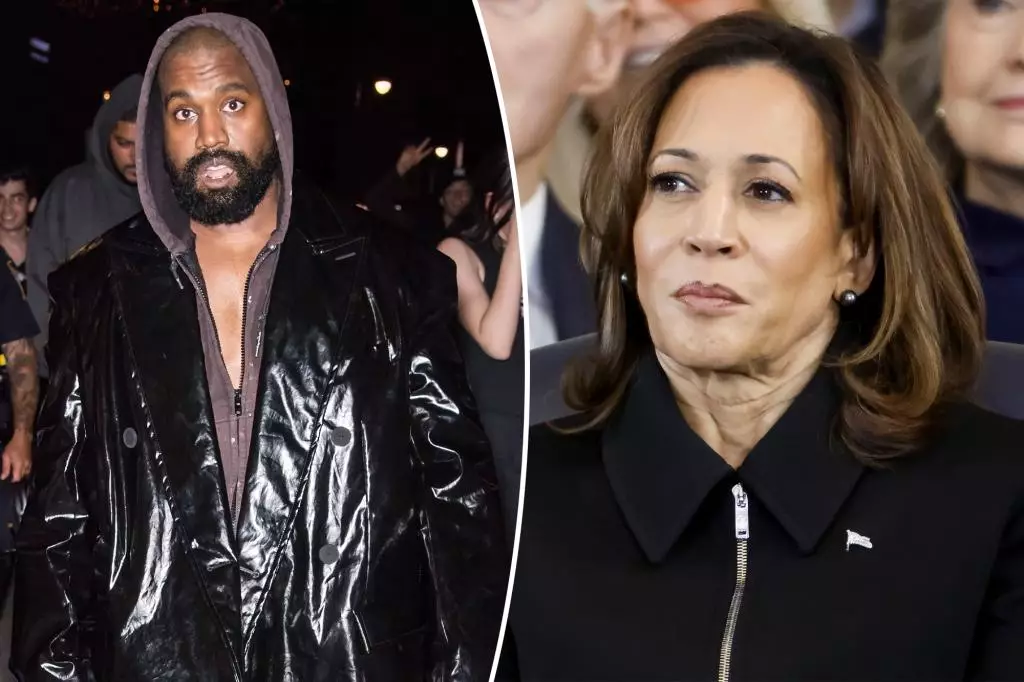The landscape of celebrity culture is littered with instances where the lines between personal expression and public accountability blur. Recent events involving Kanye West have underscored this phenomenon, providing a compelling case study on the responsibilities that come with fame and the public’s expectations of their idols. A recent post from West on social media concerning former Vice President Kamala Harris has ignited discussions around these themes, emphasizing the need for a coherent narrative on accountability, consent, and the intersectionality between politics and celebrity.
In an explicit and now-deleted tweet, Kanye West made headlines after he brazenly expressed changing feelings towards Kamala Harris. The rapper stated, “I used to want to f–k Kamala until she lost. I don’t f–k losers anymore.” This comment, not only salacious but deeply unsettling, reflects a troubling trend where public figures, especially those within the music industry, feel entitled to speak about women in a hyper-sexualized manner. Furthermore, his subsequent post poking fun at his earlier tweet and echoing his support for former President Donald Trump revealed a dismissive attitude toward political discourse and the complexities involved in it.
The repercussions of such comments in the age of social media can be monumental. Celebrities wield immense influence, and this influence often shapes societal norms. By trivializing someone’s political standing in such a manner, West inadvertently reinforces problematic perceptions around female political figures, perpetuating misogyny and reducing their worth to mere sexual objectification.
Following the fallout from his tweet, Kanye proposed a form of apology to Harris. However, it begs the question: Is an apology from an individual with a history of controversial and misogynistic remarks enough? The sincerity of such apologies is difficult to assess, especially when they follow headlines laden with controversy. The duality of West’s persona complicates the narrative: one moment he is a celebrated artist proclaiming his successes, as seen in another tweet boasting about returning to billionaire status, and in the next, he engages in hurtful banter that downplays essential discussions on gender and politics.
The dynamics of alienation from mainstream accountability, experiential authenticity, and cultural responsibility are, therefore, crucial to deconstruct. West’s jokes about the Democrats controlling black people reveal an audacious gambit with historical implications tied to race and politics, illustrating how some celebrities operate in a bubble devoid of the nuanced realities faced by ordinary individuals.
The bewildering rivalry between Kanye West and Taylor Swift adds another layer of complexity to his public persona. This feud, which began in 2009 during the MTV VMAs, continues to resurface, reminding the public of the celebrity culture that thrives on chaos and confrontation. The way West candidly references Swift in the context of being the only person he follows on Instagram is emblematic of how unresolved conflicts can be wielded as a tool for personal branding.
However, it also reflects the unhealthy cycle within celebrity media—and society at large—where drama overshadows meaningful discourse. Swift’s own artistic responses to West’s provocations illustrate the capacity of artists to reclaim and redefine narratives. Her recent album, featuring tracks rumored to critique figures who have intersected with her career, emphasizes an empowering reclaiming of agency amidst a frenzy of misinformation and lewd remarks.
Kanye West’s recent actions serve as a sobering reminder of the broader implications of celebrity behavior on public discourse. While their statements may spiral into social media banter, the consequences of their rhetoric resonate deeply. The onus lies not solely on the artist but also on society to confront and question these startling narratives continuously. As public figures redefine what it means to be accountable, it is essential for audiences to foster a culture that prioritizes respect, personal agency, and meaningful engagement over sensationalism and biased perceptions. In doing so, we pave the way for an evolved narrative—one that embraces the complexities inherent in humanity, fame, and the essential dignity of all individuals involved in discourse.
